MR. OWEN PARKER is the proprietor and head of the firm known as "Charles Parker," whose works are at Higham Ferrers, Northants. He was an ambitious boy, and whatever he set his hand to do, he determined to do it thoroughly. Educated at the Chichele Grammar School, he out-stripped his fellows, and began to turn his attention, before his comrades had realised that such a necessity awaiting them, to the important task of earning money. Though there was scope for his talents in the business of his father, the wise plan was followed of letting him pit himself against the world where he would have to make good by his abilities alone, so for five years he served as clerk in the Goods Department of the London and North Western Railway Company, and worked with extraordinary industry—for thoroughness in work seems to be part of his temperament, and also he knew that the way to success lies in the capacity for taking pains. At the end of five years he was called home by his father to assist in the management of the business of boot and shoe manufacturing. In 1890 he was taken into partnership, and on the death of his father nine years later became head and sole proprietor.
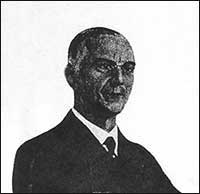 |
|
Mr Owen Parker, C.B.E., J.P.
|
So well known was Mr. Owen Parker as a man of strength and ability in his business that in 1913 he was elected President of The Incorporated Federated Associations of Boot & Shoe Manufacturers of Great Britain and Ireland; and three days after war had been declared he was summoned to the War Office by the Director of Army Contracts, to discuss the capacity of the boot and shoe industry to provide boots for the Army in addition to keeping the civil population shod. With this arose the equally serious question of the number of men whom it would be possible to draw from the industry to serve in the Army, and yet have the needed work done. To solve this great problem Mr. Parker took a census of all the workers in the trade, and of the capacity of the whole industry to turn out the great number of boots needed.
Within two months of the outbreak of the Great War, when men were being recruited at a rapid rate, he realised the necessity for a special Government Department to ensure that the ever-increasing needs of the Army for boots should be promptly met, and that the particular classes of leather required for the production of these boots should be controlled. The great organization set up by Sir Edward Penton was the result. To its remarkable efficiency our own Army and that of our Allies owe their prompt arid never-failing supply of the finest footwear in which any army ever went into the field. Mr. Parker worked continuously and in close co-operation with it up to the termination and disbanding of that department. This was not his only service to the country during those years of trouble, for he was appointed a member of numerous Government committees dealing with Labour disputes and other difficulties which constantly resulted from the disorganisation of all usual conditions, including that notable Joint Committee of masters and workers, of the National Industrial Conference, his attention being given particularly to the industry with which he is connected. In addition to this he acted on various advisory committees for the supply of leather and its allocation; and was also a member of the Leather Control Board at the War Office. In 1917, when boots for civilians were soaring in price, and also threatened to be in short supply, the Government, upon the advice of a Joint Committee of representatives of boot manufacturers and the Operatives' Union, determined upon a scheme to ensure an adequate supply of reliable footwear at the most reasonable price possible for the civilian needs.
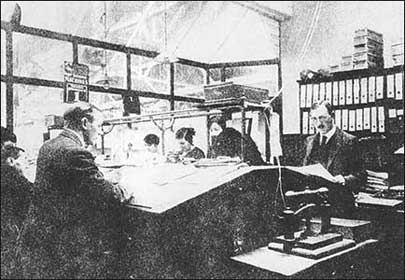 |
|
The Counting House
|
That this scheme might be carried out with the greatest efficiency Mr. Owen Parker was invited by the War Office to take control of it, and he served within the Department in a voluntary capacity for several years. The scheme very effectively served its purpose, and those who bought war-time boots and shoes will remember how excellent they were. His war activities were not, however, confined to Government work, for as a member of the County Red Cross and St. John's Ambulance Committees, he found time to further the well-being and happiness of the many wounded men who passed through the numerous County Auxiliary Hospitals, and was further able in his capacity as President of the Boot Manufacturers' Federation to raise the sum of £20,000 for the Central Red Cross Fund. In the early days of the war, when the recruiting scheme was launched by Lord Derby, he was elected to the position of Chairman of the Mid-County Recruiting Committee, and in recognition of his services on that Committee he received the O.B.E., while his work on behalf of the Government at the Raw Materials section of the War Office brought him the further honour of being made C.B.E.
To Mr. Owen Parker the Federated Associations of Boot and Shoe Manufacturers owe a debt which it recognises unstintingly. It is given to few men to have such a genius as he possesses for creating at once an atmosphere of goodwill and an unflinching adherence to essential principles. At the Annual Meeting at Norwich, in July, 1920, the Chairman said that to describe Mr. Parker's service was to burnish pure gold; and the delegates who represented the trade, rose to greet him with an ovation that expressed the heartfelt gratitude of the whole trade for services of inestimable value, and for a devotion to the interests of others that sets a standard of public service of which few have seen the equal.
Higham Ferrers is an ancient Municipal Borough, incorporated in the 13th century, in which are still to be found the remains of beautiful 15th-century buildings, and here the Charles Parker works are situated, and here Mr. Owen Parker has his home. He became Mayor of Higham Ferrers for the first time in 1897, succeeding his father, who had been Mayor three times. He, himself, has occupied the Mayoral chair no less than seven times. He is also a Member of the County Council, and a Justice of the Peace for the county.
Mr. Parker, who is a well-set-up man, has an unconscious power of making friends, which may lie in his genial smile or in the glint of humour in his eye. He also possesses that quality which is so necessary to public men—a good memory for faces and personalities. It is said that he knows intimately every one of his army of workpeople. He believes in the personal link between employer and employed, and is convinced that the friendly attitude which prevails in his factory at Higham Ferrers is the cause of the contentment and general happiness which prevail there.
A man who speaks well, is observant, shrewd in judgment and judicious m speech, who is generally liked and has won golden opinions among those with whom or over whom he has worked, is one who would do good service for his country if he followed a public career. It is said that during his period at the War Office he could have been accused of only one vice, and that was a rigid adherence to economy on behalf of the Government. Thus it is good news to hear that at the next election Mr. Parker intends to stand for Parliament as a candidate for the Kettering or Mid-Division of the County. His statesrnan-like grip upon public matters ought to be a most useful asset in the House of Commons.
His clubs are the Northampton County and the Junior Constitutional.
The firm of Charles Parker, boot and shoe manufacturers, was established in 1874 by Mr. Charles Parker, who had already made himself an effective force in the trade. He had, at a very early age, enjoyed a unique experience and managerial responsibility in two very large firms, first in London and later in the town of Northampton, which, then as now, was the chief centre for the production of high-grade gentlemen's boots and shoes. Before this period good boots and shoes were made by hand, the wearer being measured and fitted for them as for his suits. But machine-made boots of first class order were beginning to be produced, and Charles Parker took a keen interest in raising the standard of excellence of these to the highest pitch. It was indeed always his ambition to produce "only the best", an ambition which he retained throughout his life, and it is therefore not surprising that the firm which bears his name enjoys a reputation for the production of thoroughly reliable and up-to-date styles of boots and shoes.
That he might freely carry out his ideals Mr. Parker, in 1874, started his own factory in the borough of Higham Ferrers, and so justified was he in his venture, that, at the end of twelve years he found it necessary to meet the overwhelming demands for the firm’s productions by building a large new factory. Increased resources meant increased trade, and a few years later the new factory had to be considerably enlarged., and Mr. Charles Parker found not only that his business prospered, but that he could give of his time and energy to the civic life of his native town, i.e. which he was ever devoted. He was elected on the town Council, being three times Mayor of the borough.
When his son, Mr. Owen Parker, returned home to strengthen his father’s hands in a work which had grown too much for one person, there was satisfaction on all sides. Both father and son gained from the union, while the factory also gained by the acquisition of a new manager who possessed the same just views as to what was owing to the public, to the workpeople and to the trade, as those that had before governed the work. In 1890 Mr. Owen Parker was taken into partnership, and there is little doubt that he shared with his father not only the responsibilities of the business, but the respect and confidence of his townspeople, for they elected him their Mayor no less than seven times, including the Coronation years of the late King Edward and of his present Majesty. At the death of his father m 1899 he became sole proprietor and manager.
Six years later a great misfortune occurred, for the whole factory was destroyed by fire. The period of idleness was short, the business being continued in temporary premises. Rebuilding was at once commenced and in 1906 (less than one year after the catastrophe) the fine premises, illustrated in these pages, were erected and put into working order. The work in this factory is done with all the latest machinery and plant necessary to effect a large output, and to maintain the character of the goods produced. In addition to the great and ever-increasing connection in the home trade, the firm has for the past thirty years exported boots and shoes to all the principal markets of the world, especially to India, and our Dominions and Colonies, and in these great markets they enjoy an almost unrivalled reputation. The firm also sends its goods to most of the principal European countries.
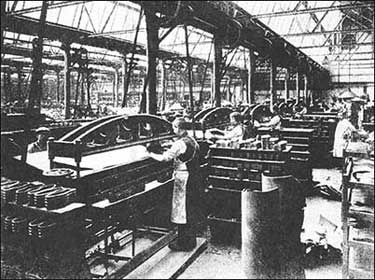 |
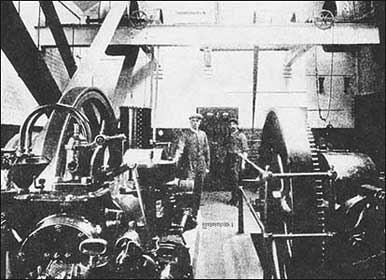 |
|
Sole cutting department
|
Engine
|
|
|
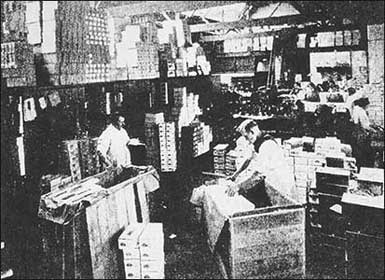 |
|
Closing department
|
Despatch room
|
In the Higham Ferrers factory every conceivable style and design of gentlemen's walking and sporting boots and shoes may be seen in the course of manufacture, including two brands which have made a great reputation for the firm all the world over, the "Knight of the Garter" and "Kornless". This latter brand is an extensive range of high grade boots and shoes for gentlemen, made on the hand-sewn principle and are sold at a moderate price. Special attention, aided by a long experience in the selection of suitable materials and suitable shapes for the many and varied markets catered for is bestowed by an efficient staff under the personal management and direction of Mr. Owen Parker. The factory itself is a model factory, built upon hygienic principles in hygienic surroundings, and all its machinery is of the most efficient character, the gas-engine driving and electric lighting plant being most up-to-date. During the Great War the firm lost many of its men to the Service, and had to fill their places with women, who proved very efficient, but every man was reinstated on his return.
Roll of Honour
(copied from Mayfair Supplement 1921)
|
| Allen |
William |
|
| Abbott |
John |
|
| Allen |
Walter |
M
|
| Allen |
Charles |
|
| Allen |
Arthur |
|
| Allen |
B W |
|
| Allen |
H |
|
| Bird |
A |
K
|
| Bishop |
C |
|
| Bird |
George |
|
| Bates |
Arthur |
|
| Bird |
Wm |
K
|
| Burgess |
Wm |
|
| Bates |
Wm E |
|
| Barnes |
H |
|
| Beeby |
W |
|
| Bollard |
J |
|
| Biggs |
J |
K
|
| Bates |
John |
|
| Cox |
Cecil |
K
|
| Church |
F A |
|
| Charles |
W |
K
|
| Cox |
Harold |
|
| Charles |
Joe |
|
| Colton |
A A |
|
| Cox |
Sydney |
K
|
| Cherry |
A F |
|
| Clarke |
C |
|
| Church |
Er? |
|
| Chaplin |
Thos |
|
| Clayton |
G H |
|
| Currall |
A E G |
K
|
| Draper |
Ernest |
M
|
|
 |
| Mead |
Clarence |
|
| Neville |
Ar MC |
|
| Newell |
A |
|
| Newell |
Sydney |
|
| Pruden |
F |
|
| Pack |
F |
|
| Pettit |
A |
|
| Pashler |
D |
K
|
| Pettit |
T F |
P
|
| Perkins |
Frank |
|
| Poffe |
E |
|
| Pattison |
J |
|
| Powell |
M |
K
|
| Palmer |
P |
|
| Pearcey |
T |
K
|
| Ridout |
J W |
|
| Robsinon |
J |
|
| Richardson |
V |
|
| Stimpson |
Wm |
P
|
| Stokes |
W |
|
| Seamark |
C |
|
| Stimpson |
Walter |
K
|
| Smith |
F |
K
|
| Simmons |
Horace |
|
| Smith |
Wm |
|
| Turnock |
S |
S
|
| Parr |
David |
|
| Taylor |
Percy |
|
| Verbert |
F |
|
| Wise |
F |
|
| Wallis-Jeffs |
B |
|
| Wilson |
Percy |
|
| Yorke |
Geo |
|
|
| Dawkes |
A |
|
| Draper |
Cyril |
|
| Dunn |
C |
|
| Dickenson |
W |
|
| Driver |
E |
|
| Dunmore |
George |
|
| Draper |
Harold |
|
| Dickenson |
Fred |
|
| Greaves |
Geo |
|
| Groome |
Geo |
|
| Groome |
Eric |
|
| Glenister |
P |
|
| Green |
G B |
|
| Goode |
W |
|
| Gomm |
Jess |
|
| Goybels |
C |
|
| Hurst |
A |
|
| Hulett |
W |
K
|
| Hunt |
Gerald G |
|
| Horsfield |
F |
|
| Howard |
W |
|
|
| Hillson |
W |
P
|
| Ingram |
E |
|
| Johnson |
J W |
|
| Key |
J |
|
| Kilsby |
E Fr |
|
| Kearsley |
O |
|
| Lambert |
Ar Thos |
|
| Lucas-Mills |
C |
|
| Livingstone |
W |
|
| Miller |
Geo |
|
| Morris |
Hugh |
|
| Maple |
Wm |
|
| Moulton |
H |
K
|
| Mantle |
Howard |
K
|
| Mansbridge |
C A MM |
|
| Mead |
A |
|
| Miller |
H Fr |
K
|
| Mitchell |
C P |
|
| Miller-Bates |
W |
|
| Morris |
C P |
P
|
| Moore |
Reginald |
|
|
|
Note: At the bottom of the sheet there are four shields - replaced here by the letters:
|
|
S = Still on Service
|
P = Prisoner of War
|
K = Killed In Action
|
M = Missing
|
At present there are three hundred or more workers employed here under the most favourable and healthy conditions, some of whom have been in the firm's service for more than forty years. The general atmosphere is one of content and confidence, bred of the knowledge that the firm is fair in all its dealings, that a conscientious regard is shown for all who do business with them, that they aim at producing, and do produce, goods which are of high quality, comparable only with the best work of the best Northampton houses, and that personal interest is taken in every worker by the proprietor, who knows individually everyone in his employ. This invariable good feeling which exists between all who co-operate in carrying on this enterprise augurs a continuance of the success of which everyone concerned may be alike confident and proud.
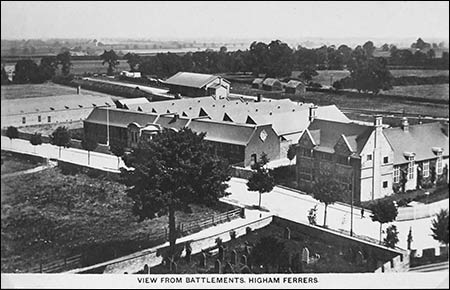 |
The factory viewed from the church tower and the Parish Rooms (right)
|
|
Rushden Echo, 30th July 1920
Bowls—A match, Mr Parker’s factory v. Mr H R Patenall’s factory, was played on Wednesday evening on Mr H Rollins Patenall’s lawn. Scores: J B Partridge, A Beetson, M Tinston, C F Felce (Mr Parker’s factory), 28: W Lawrence, W Gadsby, H O Pashler, J Horsfield (Mr Patenall’s factory), 6: W Gray, W Hales, L Garley, F Twelvertree (Parker’s) 14: H R Patenall, A Pack, J Adams, J Parker (Patenall’s) 7.
|
|